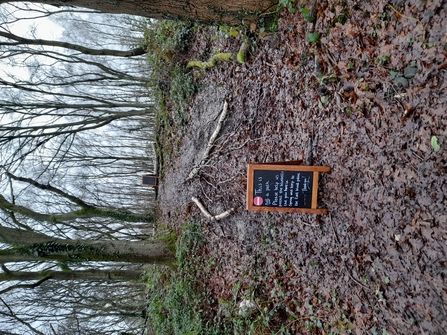- Bird hides are closed at the moment as part of Covid 19 guidance. There have been some instances of people trying to climb round or even onto the bird hides to see the birds at Blashford Lakes Nature Reserve. This disturbs the birds, and one of the hides now needs repairs to its roof because of people climbing on it.
- Paths at St Cross Meadow, part of Winchester nature reserves, are heavily trampled, contributing to soil erosion. Lots of people are walking on grassy verges and widening the existing paths into the adjacent habitat.
- The Trust are also seeing more people swimming on our nature reserves, which is disturbing wildlife. There are reports that kingfishers are no longer seen in certain areas where there are often swimmers; and there has also been erosion to bank sides and damage to tree roots. In particular Winnall Moors Nature Reserve has been affected by this.
- Flexford and Swanwick Lakes both have seen widening footpaths and are very churned up with mud (being fairly wet nature reserves). Lots of desire lines are being created in the bluebell woods and meadows as people ignore signs and paths and wend their own way through sites. This is particularly damaging as spring flowers are emerging and the additional paths contribute to erosion.
- Destruction of signage, fires and litter are all increasing on some nature reserves as evenings get lighter.
- We are seeing many dogs off the lead and in the water which are impacting waterfowl - soon beginning to breed.
- The Trust has seen an increase in sheep worrying, with one instance requiring significant vetinary treatment. Dogs must be kept under control where livestock are present.
The Trust has however received positive comments from the public on our one-way path arrangements to help with distancing and the dog-free status on some reserves.
Debbie Tann, Chief Executive for the Trust said:
“The Covid-19 crisis has awakened a new found love of the outdoors, and it’s great that many people are enjoying all the benefits that nature provides. However, we are increasingly concerned at the level of pressure our nature reserves are under – not just from the sheer numbers of visitors disturbing wildlife and trampling fragile habitats, but also from unthinking and selfish behaviour in a small minority of people which is causing significant damage to site infrastructure. There’s a growing demand for more quality green space for people and wildlife which is one of the reasons we are calling on the government to create a Nature Recovery Network. In the meantime, our message to the public is clear – our nature reserves are special and fragile places, please enjoy them quietly and responsibly and leave no trace of your visit.”

